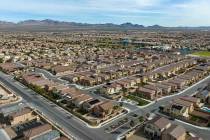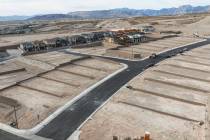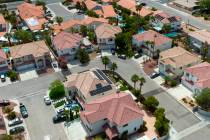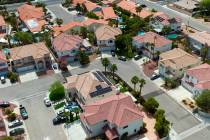Assessor’s numbers used for analysis
Home ownership figures, from a new study done by the Las Vegas Review-Journal, call into question more optimistic ones traditionally quoted to demonstrate the high quality of life in Las Vegas.
The new figures show that in Clark County about 60 percent of those living in single-family homes actually own them, and the figure has been declining several years. The figures were provided by the Clark County Assessor’s office at the request of the Review-Journal.
The Review-Journal originally tried other sources to obtain the ratio of owner occupancy to single-family homes but found those sources did not agree with assessor data the Review-Journal obtained previously for certain neighborhoods.
Because the assessor’s records are the official and most reliable data, the Review-Journal then sought them for each major jurisdiction in the county.
The U.S. Census’ American Community Survey for 2006-2008 and Las Vegas Perspective — an annual publication that lists information about Southern Nevada’s population, demographics, schools, neighborhoods, and public and social services — did not agree with the assessor’s data.
For example, the Community Survey said the percentage of owner-occupied homes in Las Vegas was 79 percent and 82 percent in Henderson. Both figures are far higher than the assessor’s records indicate.
The Perspective lists data by zip code while the Review-Journal’s preliminary information was based on boundaries set by major streets.
But for the same general area in North Las Vegas, Perspective lists 86 percent of the single-family homes as owner-occupied, much higher than the approximately 60 percent indicated by assessor records.
The assessor’s figures are based on the different tax rates paid for nonowner-occupied homes and, in some cases, affidavits property owners file with their tax records.
The Community Survey provides demographic, economic and other Census data in the years between the actual Census performed every 10 years. The Community Survey bases its information on phone surveys, historic data and growth statistics from state and local governments, according to a spokeswoman for the Community Survey.
Las Vegas Perspective is "the market’s primary economic development and information tool," according to the 2010 issue. "It is distributed to business, industry, government, libraries and interested private individuals to encourage both relocation and expansion in Southern Nevada."
The Perspective’s work has been so highly regarded that its demographic data is referenced on the city of Las Vegas’ website and on the website for the Las Vegas Area Chamber of Commerce.
Las Vegas Perspective is compiled by a local nonprofit, the Metropolitan Research Association, which is funded as a public service by six sponsors, including the Las Vegas Review-Journal, Wells Fargo Bank and the Nevada Development Authority.
Research for Las Vegas Perspective is overseen by Las Vegas-based Applied Analysis. Brian Gordon, principal with Applied Analysis, said the ratios of renters to owners in single-family homes are based on a "bunch of different data," such as Census information, figures from the Clark County Comprehensive Planning Department and other "third-party sources."
Under the publication’s section titled "Data Collection and Limitations," it states, "While we have no reason to doubt the accuracy of the data reported herein, the information collected was not subjected to auditing or review procedures by Las Vegas Perspective; and therefore, we make no representations or assurances as to its completeness."
Contact reporter Frank Geary at fgeary @reviewjournal.com or 702-383-0277.
RELATED STORIES• Who’s living there? Owner-occupied houses decline in Clark County
• Ideally, you’ll find owners at home


















